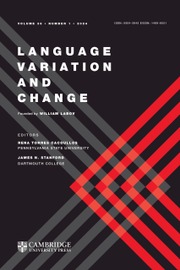No CrossRef data available.
Article contents
A sociohistorical basis of grammatical simplification: The absolute construction in nineteenth-century Tejano narrative discourse
Published online by Cambridge University Press: 25 May 2001
Abstract
This article examines the reduction of syntactic options in South Texas Spanish narrative discourse during the nineteenth century. I argue that nineteenth-century Texas Spanish made ample use of the absolute construction as an orientation strategy in narrative discourse. In the beginning of the century the absolute construction appeared quite frequently in the narratives analyzed, but by the turn of the century the construction had become virtually unknown. I argue that the loss was actualized through a series of reductive changes that were played out in the internal and external syntax of the construction. These reductive changes, I suggest, not only cut across stylistic boundaries, but also corresponded with social changes under way with the incorporation of the region into the United States. The notion of “historical generation,” as it has emerged in social theory, is invoked as a significant social variable in relation to the linguistic variation and change observed.
- Type
- Research Article
- Information
- Copyright
- © 2000 Cambridge University Press




